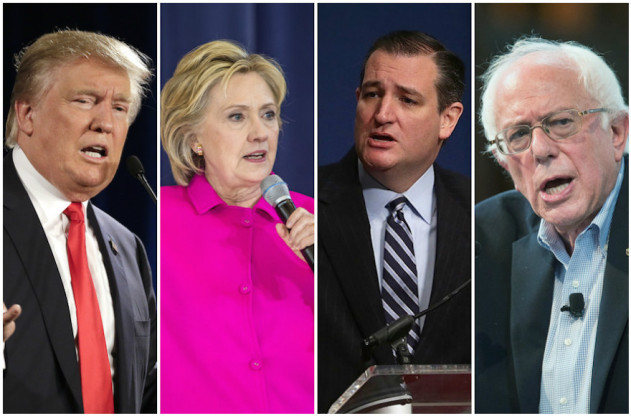Folks invested in the U.S. presidential race are picking sides in an O.K. Corral sort of way—reason and civility be damned—and it’s getting ugly.
These are particularly polarizing times. I mean polarizing to the extreme, if that’s not too obvious a redundancy. Folks invested in the U.S. presidential race are picking sides in an O.K. Corral sort of way—reason and civility be damned—and it’s getting ugly.
Grown men are fighting on the debate stage over whose hands are smaller and whose are larger (wink, wink). Protesters at campaign rallies are getting punched in the face. Longtime friends are “unfollowing” each other on social media because they can’t stomach each other’s choices in the upcoming election.
Despite the desperate efforts of some devoted Facebookers to counter the attacks—posting feel-good memes distracting us back to the alternative realities of TV’s Happy Days, The Andy Griffith Show or The Courtship of Eddie’s Father (“People, let me tell you about my best friend … he’s a warm-hearted person who’ll love me to the end”)—last week a petition was circulating to allow guns to be openly carried at July’s Republican National Convention.
I don’t remember a time when the national political dialogue was this aggressive.
When Barack Obama ran on a “hope and change” platform in 2008, plenty of people denounced him as a dangerous pie-in-the-sky liberal—but there was no violence in the streets. (Well, James Carville suggested there’d be riots if Obama won the election, just like Donald Trump has suggested there’ll be riots if the GOP is forced to hold a brokered convention in Cleveland. So I guess there are a few similarities.)
But really, does it have to be this way? Why can’t we all just get along, or at the very least, eliminate all the name-calling as an extension of candidate quid pro quo?
This is something I’ve been thinking about the past several weeks as the primary season makes its relentless, inexorable march across the country, leading up to the Mother of All Elections on Nov. 8. I’m sorry to say I’ve dabbled in the Hatfields-and-McCoys drama myself, though I’ve stopped short of trash-talking those with whom I disagree.
Still, I repent of my participation in chatter that attempts to pigeonhole people’s political predilections.
After all, no matter how much we might want to shove folks into tidy (but one-dimensional) boxes, such as Birthers vs. Climate Changers, Capitalists vs. Socialists, or Gun Nuts vs. Peaceniks, each of us is more complex than that. We are products of our upbringings, our experiences, and our outlooks, peering through individual life lenses, which—like a kaleidoscope—are made of many colors and shapes that tumble and turn with the times.
As much as we talk about who we’re “for” or “against,” it’s to our peril to divide ourselves into a modern day equivalent of the Israelites and the Egyptians, lest a veritable Red Sea of posturing and triviality, crashing over rocks of recklessness and cruelty, thrash and drown us all.
A bit of navel-gazing and a few very pointed social media messages—nasty, go-for-the-jugular notes that not only lambasted a White House hopeful but maligned whole groups of his or her supporters as well—have reformed me, and I pledge to abstain from the finger-pointing fray in the future.
Simply said, I don’t want to be like that. I’d rather elevate the conversation than help it devolve. I’ve been listening to my mother’s admonition that if I can’t say something nice, I shouldn’t say anything at all. I’m going to speak and write about my preferred presidential aspirant’s virtues, sure—I feel that’s my duty as an informed and engaged citizen—but stay away from demonizing those whose views don’t mirror my own.
I paid close attention when a house finch landed on the lectern as Democratic candidate Bernie Sanders addressed a crowd inside the Moda Center in Portland, Oregon, March 25, as if by magic or force of nature. I believe it was a sign of positive things to come—no matter who becomes the next leader of the free world.
Who will “love us to the end,” as Eddie’s father sang in the theme music of that 1970s sitcom? Who’ll lead our nation to a better day for all the people, not just the loudest few on each end of a charged-up spectrum?
That remains to be seen. But I think that above it all flies a prophetic bird, and the bird has the word, and that word is peace.
Nancy Townsley’s work has most recently been published in Brain, Child Magazine, Elephant Journal, NAILED Magazine, The Riveter Magazine, and Bleed, a literary blog from Jaded Ibis Press. She lives on a floating home on the Multnomah Channel in Scappoose, Oregon.
Other Links:

